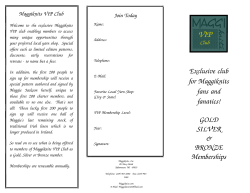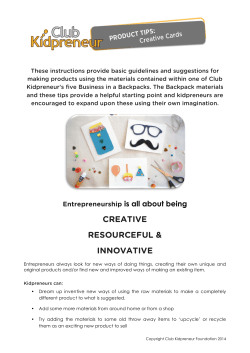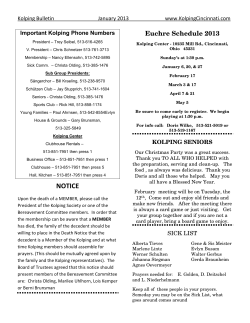
EXECUTIVE INSIGHTS Why Costco and Other Warehouse Club Retailers Matter Spotlighting Costco
EXECUTIVE INSIGHTS VOLUME XII, ISSUE 5 Why Costco and Other Warehouse Club Retailers Matter “Value”and “discounts”are buzzwords that many retailers have been using to attract customers for decades. Warehouse club Spotlighting Costco retailers have expanded the value-pricing model by providing Costco is an increasingly dominant force in the U.S. retail members with access to food, electronics and other packaged landscape. As the nation’s third-largest retailer, Costco goods in bulk and at sizeable discounts. The warehouse club generated nearly $58 billion in U.S. revenues during the 2009 channel is now big business with Costco, Sam’s Club and BJ’s calendar year, ranking ahead of Target, Walgreens, Home Wholesale Club collectively earning an estimated $114 billion Depot and other well-known retailers. It continues to expand in U.S. revenues during the 2009 calendar year. its footprint by adding to its 57 million consumer and business Despite the significant market potential that warehouse clubs members globally, and its 414 U.S. warehouses. present, this retail channel remains a paradox for many con- However, Costco also presents CPG companies with unique chal- sumer products goods (CPG) companies. On the one hand it is lenges and channel characteristics that are very different from a large, attractive and promising channel. On the other hand, it has several unique characteristics that make it challenging for CPG companies to succeed. While each of the three major grocery and mass retailers. Several of the most obvious include: 1. Limited Selection. A key tenet of Costco’s business warehouse clubs provides a significant opportunity for CPG strategy is to limit the number of different items on its companies, L.E.K. Consulting is using Costco, the market shelves. The company evaluates stock keeping units (SKUs) leader, to illustrate the unique dynamics with this retail channel. individually and selects both category leaders and emerging Figure 1 brands to sell. Company product selection criteria includes Estimated U.S. Warehouse Club Market Size (Billions*) e (Billions*) and price. Costco’s focused SKU selection helps to reduce operational costs by streamlining its supply chain and BJ’s, $9.7 (9%) Sam’s Club, $46.7 (41%) value, sales potential, how products expand their categories simplifying in-store management. Its SKU-constrained environment also limits the freedom available to CPG companies – many of which are accustomed to owning prominent real estate in store aisles. Costco, $57.7 (50%) 2. Price Conscious. Unlike traditional retailers that generate revenues based on merchandise markups, Costco and other K.Consulting analysis. club retailers can sell merchandise at close to break-even levels and gain a majority of their profits via membership fees. Costco Sam’s Club BJ’s * Estimated 2009 U.S.market share based on company financials and L.E.K.Consulting analysis. This business model enables Costco to place relentless price pressure on CPG vendors, sell products at low profit margins Why Costco and Other Warehouse Club Retailers Matter was written by Alex Evans and Jamil Satchu, Vice Presidents of L.E.K. Consulting. If you would like to discuss these issues further and how L.E.K. can help you achieve greater success in the warehouse retail channel, please contact us at consumerproducts@lek.com. ture Canned Tuna L.E.K. Consulting Executive Insights Size Price/Oz LEK.COM EXECUTIVE INSIGHTS 3. Private-Label Power. CPG companies face private-label competition at many major retailers including Walmart’s Great Value, Target’s Archer Farms and CVS’s branded product line. Costco’s strong private label offering, Kirkland Signature, competes with brands in an ever-expanding range of categories. Many private-label brands provide consumers with economical options for their shopping lists, and Kirkland Signature is typically 10%-20% lower than its branded counterparts. That said, Kirkland Signature also competes directly with many national CPG firms on quality. This focus on value has evolved to position Kirkland Signature products as slightly more expensive in many categories than comparable national brands – including Figure 1 canned tuna, salsa andClub pet Market snacks (see 2). Estimated U.S. Warehouse SizeFigure (Billions*) For example, Kirkland Signature is positioning its value – and pricing – head-to-head with other national canned tuna brands. Bumblebee and Chicken of the Sea entered Costco with a similar quality product, and Bumblebee managed to attain its premium pricing. Positioning Kirkland Signature as a premiumpriced brand – but not the most expensive option – gives Costco the opportunity to brand itself as a quality product with a slight value (price) advantage over its CPG competitors. Addressing Three Common Missteps Working With Warehouse Club Retailers In L.E.K.’s Retail and Consumer Products practice, we see the difficulty that some CPG companies have succeeding in the club channel – specifically with Costco. Drawing from client experiences and our own analysis, L.E.K. has outlined common missteps – and associated best practices – for CPG companies to capitalize on the warehouse club channel. 1. Neglecting Club Retailers in the Planning Process Figure 1 Challenge: Many CPG companies focus their marketing and Estimated U.S. Warehouse Club Market Size (Billions*) innovation planning process toward mass retail and grocery chains – with “alternative channels” such as Costco addressed BJ’s, leads to success. as afterthoughts. This orientation rarely $9.7 Business Plan: Solution – Develop a Costco-Specific (9%) Costco is a unique retailing environment and is probably among the most challenging that CPG companies will face. Sam’s Club, We find that successful $46.7 CPG companies develop Costcospecific strategies(41%) that incorporate sales, brand management, marketing and product development. Costco, $57.7 2. Focusing on Margin Percent Rather (50%) than Margin Dollars 4. Distributed Purchasing. Costco complements its global reach by also addressing regional preferences, such as a Challenge: With its promise of delivering value to the higher demand for salsa in the Southwest than in other * Estimated 2009 U.S.market share based on company financials and L.E.K.Consulting analysis. member, Costco’s per-unit pricing is typically lower than U.S. markets. Costco procures goods on a local basis and comparable products in mainstream retail channels. This, also provides managers at each warehouse with some of course, leads to gross-margin compression for CPGs discretion over what goods they carry. While this approach Costco BJ’s compared to other channels. TheSam’s offsetClub is that successful provides Costco with the flexibility to tailor its offerings on SKUs in Costco can drive more dollar volume than in other a per-store basis, this system also requires CPG companies to * Estimated 2009 U.S.market share based on company financials and L.E.K.Consulting analysis channels. This important point, however, is often obscured sell to a myriad of Costco buyers across multiple levels, which when companies focus heavily on margin percent – and do makes national clearance challenging for vendors. not adequately evaluate margin dollars – when examining Figure 2 the value of warehouse channel opportunities. Premium Pricing for Kirkland Signature Canned Tuna Solution – Reassess Success Measurements with Club Channel Retailers: This requires a change of mindset, from Vendor Size Price/Oz a focus on percent margins to total dollars earned. Costco will never deliver the same gross margin as grocery or mass Bumblebee Solid White Albacore Tuna 8/7 oz $0.221 retailers, but it can deliver large sales figures. One of the overlooked benefits of Costco is its size and scale as a national retailer. Some of L.E.K.’s CPG clients actually sell Page 2 Kirkland Signature Solid White Albacore Tuna 8/7 oz $0.214 Chicken of the Sea Solid White Albacore Tuna 8/7 oz $0.205 L.E.K. Consulting Executive Insights Vol. XII, Issue 5 more at Costco than at Walmart. LEK.COM EXECUTIVE INSIGHTS 3. Underestimating Private-Label Strength products before launch to traditional channels – the reverse of the common pattern between club retailers and CPGs. Challenge: Since its launch in 1995, Kirkland Signature has been a centerpiece for Costco, and now generates approximately 20% of the company’s sales. As noted in Figure 2, there are instances where Kirkland Signature can command a premium in specific categories by introducing a quality product. If Kirkland Signature leapfrogs a CPG company in perceived quality and associated premium pricing, it becomes extremely difficult for the CPG vendor to reestablish category momentum at Costco. That said, Kirkland Signature’s dual focus on price and quality creates opportunities for CPG companies to supply Costco with private-label products under the Kirkland Signature label. Solution – Reassess Product Development for the Club Channel: CPG companies may consider engaging club retailers early in the product development phase and eliciting feedback from them. Costco’s corporate food buyers, for example, are looking for innovative products with clean ingredient lines for their members. The club channels’ quick product rotation and sampling programs also lend themselves to new product trials. Specifically, Sam’s Club is emphasizing its in-club sampling program and product testing initiatives to entice CPG companies and differentiate itself from Costco and BJ’s. Working in conjunction with receptive warehouse club buyers, savvy CPG companies can develop and trial warehouse L.E.K. Consulting is a global management consulting firm that uses deep industry expertise and analytical rigor to help clients solve their most critical business problems. Founded more than 25 years ago, L.E.K. employs more than 900 professionals in 20 offices across Europe, the Americas and Asia-Pacific. L.E.K. advises and supports global companies that are leaders in their industries – including the largest private and public sector organizations, private equity firms and emerging entrepreneurial businesses. L.E.K. helps business leaders consistently make better decisions, deliver improved business performance and create greater shareholder returns. For more information, go to www.lek.com. Page 3 Making Big Gains With the Club Channel The retail market is increasingly fragmented, with the warehouse club channel operating unlike any of its discount merchandise counterparts. Successful CPG companies must develop unique programs for this channel – formulated into their product strategy and planning processes. It’s also essential to understand the club retail channel mindset, and think in terms of volume sales rather than per product margin. While there are commonalities in the warehouse retail market, each of the big-three vendors has distinct characteristics and strengths. Analyst firm Wall Street Strategies notes that Costco generates just 21% of sales from food, compared to 65% for BJ’s. Geography is also a factor, as Costco owns a robust nationwide footprint and is eyeing continued global expansion. Sam’s Club features 600 stores domestically and nearly 130 locations worldwide. Conversely, BJ’s 180 clubs are clustered in 15 Eastern states. Understanding the collective mindset of the club channel, combined with the niche that each company has, will enable CPG vendors to develop tailored programs that can be effective and profitable for this increasingly important market. For further information contact: Boston New York 28 State Street 16th Floor Boston, MA 02109 Telephone: 617.951.9500 Facsimile: 617.951.9392 650 Fifth Avenue 25th Floor New York, NY 10019 Telephone: 212.582.2499 Facsimile: 212.582.8505 Chicago San Francisco One North Wacker Drive 39th Floor Chicago, IL 60606 Telephone: 312.913.6400 Facsimile: 312.782.4583 100 Pine Street Suite 2000 San Francisco, CA 94111 Telephone: 415.676.5500 Facsimile: 415.627.9071 Los Angeles 1100 Glendon Avenue 21st Floor Los Angeles, CA 90024 Telephone: 310.209.9800 Facsimile: 310.209.9125 L.E.K. Consulting Executive Insights Vol. XII, Issue 5 International Offices: Auckland Bangkok Beijing London Melbourne Milan Mumbai Munich New Delhi Paris Shanghai Singapore Sydney Tokyo Wroclaw LEK.COM
© Copyright 2025










